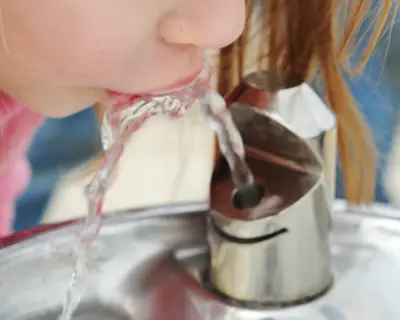RESEARCH TRIANGLE PARK, N.C. – Child care centers and schools using public water supplies are not routinely monitored for lead, which may put young children at risk for lead poisoning that can cause developmental delays, lower IQ, damage the nervous system, and produce a variety of other health problems.
Nearly 100 North Carolina child care centers that use public water supplies are partnering with RTI International to test for lead. Additional child care centers and elementary schools can enroll in the study through the end of September. Participation in the study is free and participant results are private.
“RTI is sponsoring the Clean Water for Carolina Kids study to ensure child care centers and schools provide the highest possible quality drinking water,” said Jennifer Hoponick Redmon, environmental health scientist at RTI and co-project director. “As a working parent, I believe it is critical for children spending much of their week in child care or school to have safe drinking water.”
The public health crisis in Flint, Michigan, spurred national attention about lead in drinking water. Lead may be detected in drinking water with variation from tap to tap. Lead may be in the fixtures themselves, the solder used in plumbing, or the building’s main plumbing pipes. Plumbing infrastructure is of particularly note if the building was constructed before 1988, when revisions to the Safe Drinking Water Act went into effect.
As child care centers and schools within the public water supply are not required to, and thus are usually not tested for lead, the RTI study team will complete an onsite visit and work with staff members to collect water samples. The water samples will be sent to RTI's Analytical Sciences Laboratory, where they will be analyzed for lead using U.S. Environmental Protection Agency (EPA) methods.
“RTI uses advanced instrumentation to measure many hazardous substances, including lead at 0.1 part per billion, 30 times lower than most North Carolina city and county water treatment utilities. Our testing facility provides organizations with the ability to spot harmful trends in their efforts to keep water safe for children and the general public,” said Keith Levine, Ph.D., director of RTI’s Analytical Sciences Laboratory and co-project director.
RTI researchers will share the results of the testing with each child care center and any recommended actions that the child care center should take, such as practicing clean water habits (e.g., using cold water for drinking or cooking), communicating with parents and teachers about water quality, installing drinking water filters, and using water coolers, fountains, and hoses that are certified by the National Science Foundation to be lead-free.
“Through the Clean Water for Carolina Kids study, we hope to demonstrate the importance of on-site lead monitoring for child care centers and schools,” Hoponick Redmon said. “We also want to communicate with teachers, principals and child care providers about what is currently required versus what is ideal from a health standpoint. If lead in drinking water is detected, it can be addressed with simple, affordable solutions that child care centers and schools can implement themselves.”

- Nearly 100 North Carolina child care centers that use public water supplies are partnering with RTI International to test for lead
- Child care centers and schools using public water supplies are not routinely monitored for lead, which may put young children at risk for lead poisoning that can cause developmental delays and produce a variety of other health problems
- Additional childcare centers and elementary schools are sought to enroll. Those interested in enrolling can contact cleanwater@rti.org
RTI International Media Relations:

